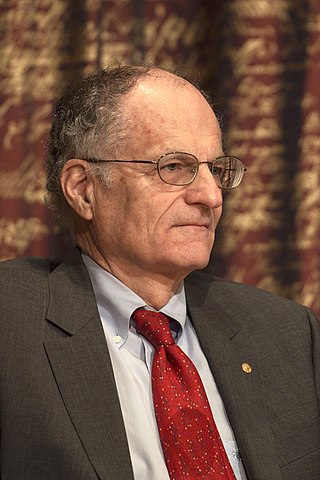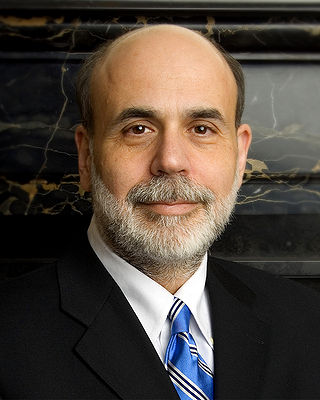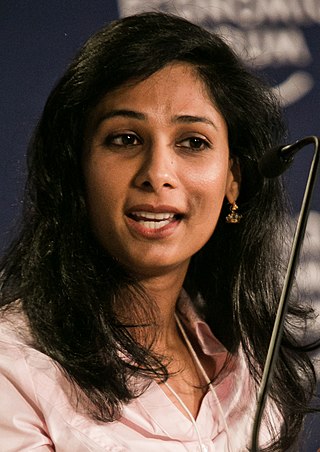Related Research Articles
Monetary economics is the branch of economics that studies the different competing theories of money: it provides a framework for analyzing money and considers its functions, and it considers how money can gain acceptance purely because of its convenience as a public good. The discipline has historically prefigured, and remains integrally linked to, macroeconomics. This branch also examines the effects of monetary systems, including regulation of money and associated financial institutions and international aspects.

Edward Christian Prescott was an American economist. He received the Nobel Memorial Prize in Economics in 2004, sharing the award with Finn E. Kydland, "for their contributions to dynamic macroeconomics: the time consistency of economic policy and the driving forces behind business cycles". This research was primarily conducted while both Kydland and Prescott were affiliated with the Graduate School of Industrial Administration at Carnegie Mellon University. According to the IDEAS/RePEc rankings, he was the 19th most widely cited economist in the world in 2013. In August 2014, Prescott was appointed an Adjunct Distinguished Economic Professor at the Australian National University (ANU) in Canberra, Australia. Prescott died of cancer on November 6, 2022, at the age of 81.
Nancy Laura Stokey has been the Frederick Henry Prince Distinguished Service Professor of Economics at the University of Chicago since 1990 and focuses particularly on mathematical economics while recently conducting research about Growth Theory, economic dynamics, and fiscal/monetary policy. She earned her BA in economics from the University of Pennsylvania in 1972 and her PhD from Harvard University in 1978, under the direction of thesis advisor Kenneth Arrow. She is a Fellow of the Econometric Society, the American Academy of Arts and Sciences and the National Academy of Sciences. She previously served as a co editor of Econometrica and was a member of the Expert Panel of the Copenhagen Consensus. She received her Honorary Doctor of Laws (L.L.D) in 2012 from the University of Western Ontario. Much of her work has been done by digesting economic dynamics, which most of this work is done as an expositor. She spent a great deal of time recently researching growth theory, economic dynamics, as well as fiscal and monetary policy.

John Brian Taylor is the Mary and Robert Raymond Professor of Economics at Stanford University, and the George P. Shultz Senior Fellow in Economics at Stanford University's Hoover Institution.

Thomas John Sargent is an American economist and the W.R. Berkley Professor of Economics and Business at New York University. He specializes in the fields of macroeconomics, monetary economics, and time series econometrics. As of 2020, he ranks as the 29th most cited economist in the world. He was awarded the Nobel Memorial Prize in Economics in 2011 together with Christopher A. Sims for their "empirical research on cause and effect in the macroeconomy".

Ben Shalom Bernanke is an American economist who served as the 14th chairman of the Federal Reserve from 2006 to 2014. After leaving the Fed, he was appointed a distinguished fellow at the Brookings Institution. During his tenure as chairman, Bernanke oversaw the Federal Reserve's response to the late-2000s financial crisis, for which he was named the 2009 Time Person of the Year. Before becoming Federal Reserve chairman, Bernanke was a tenured professor at Princeton University and chaired the department of economics there from 1996 to September 2002, when he went on public service leave. Bernanke was awarded the 2022 Nobel Memorial Prize in Economic Sciences, jointly with Douglas Diamond and Philip H. Dybvig, "for research on banks and financial crises", more specifically for his analysis of the Great Depression.

Jordi Galí is a Spanish macroeconomist who is regarded as one of the main figures in New Keynesian macroeconomics today. He is currently the director of the Centre de Recerca en Economia Internacional at Universitat Pompeu Fabra and a Research Professor at the Barcelona Graduate School of Economics. After obtaining his doctorate from MIT in 1989 under the supervision of Olivier Blanchard, he held faculty positions at Columbia University and New York University before moving to Barcelona.
Charles L. Evans was the ninth president and chief executive officer of the Federal Reserve Bank of Chicago from 2007 to 2023. In that capacity, he serves on the Federal Open Market Committee (FOMC), the Federal Reserve System's monetary policy-making body.
David Hibbard Romer is an American economist, the Herman Royer Professor of Political Economy at the University of California, Berkeley, and the author of a standard textbook in graduate macroeconomics as well as many influential economic papers, particularly in the area of New Keynesian economics. He is also the husband and close collaborator of Council of Economic Advisers former Chairwoman Christina Romer.
Neil Wallace is an American economist and professor of economics at Penn State University. He is considered one of the main proponents of new classical macroeconomics in the field of economics.

Narayana Rao Kocherlakota is an American economist and the Lionel W. McKenzie Professor of Economics at the University of Rochester. Previously, he served as the 12th president of the Federal Reserve Bank of Minneapolis until December 31, 2015. Appointed in 2009, he joined the Federal Open Markets Committee in 2011. In 2012, he was named one of the top 100 Global Thinkers by Foreign Policy magazine.

Gita Gopinath is an Indian-American economist who has served as the first deputy managing director of the International Monetary Fund (IMF), since 21 January 2022. She had previously served as chief economist of the IMF between 2019 and 2022.
Andrew Bruce Abel is an American economist, a professor in the Department of Finance in The Wharton School of the University of Pennsylvania.

Mary Colleen Daly is an American economist, who became the 13th President and chief executive officer of the Federal Reserve Bank of San Francisco on October 1, 2018. She serves on the Federal Reserve's rate-setting Federal Open Market Committee on a rotating basis. Previously, Daly was the Executive Vice President and Director of Research of the Federal Reserve Bank of San Francisco, which she joined as an economist in 1996.

Philip Nathan Jefferson is an American economist who served as a member of the Federal Reserve Board of Governors since 2022. He was previously vice president for academic affairs, dean of the faculty, and Paul B. Freeland professor of economics at Davidson College, Centennial Professor of Economics at Swarthmore College, a research economist for the Federal Reserve, and a professor at Columbia University. President Biden nominated him to serve as a member of the Board of Governors of the Federal Reserve System in January 2022. He became the fourth Black man to sit on the Federal Reserve's Board after the Senate confirmed his nomination on May 11, 2022. He was sworn in on May 23, 2022.

Christopher J. Waller is an American economist who is a member of the Federal Reserve Board of Governors since 2020. A nominee of then-President Donald Trump, he was confirmed by the Senate in December 2020, to serve through January 2030.

Benjamin Moll is a German macroeconomist who is Professor of Economics at the London School of Economics. He is the recipient of the 2017 Bernacer Prize for his "path-breaking contributions to incorporate consumer and firm heterogeneity into macroeconomic models and use such models to study rich interactions between inequality and the macroeconomy".
Greg Kaplan is professor of economics at the University of Chicago. His research encompasses macroeconomics, labor economics and applied microeconomics, with a focus on distributional issues.

On September 17, 2019, interest rates on overnight repurchase agreements, which are short-term loans between financial institutions, experienced a sudden and unexpected spike. A measure of the interest rate on overnight repos in the United States, the Secured Overnight Financing Rate (SOFR), increased from 2.43 percent on September 16 to 5.25 percent on September 17. During the trading day, interest rates reached as high as 10 percent. The activity also affected the interest rates on unsecured loans between financial institutions, and the Effective Federal Funds Rate (EFFR), which serves as a measure for such interest rates, moved above its target range determined by the Federal Reserve.
Lee Edward Ohanion is an American economist, columnist, and author known for his work regarding the Great Depression and monetary policy. He is a distinguished professor of economics at the University of California, Los Angeles and serves as a senior fellow at the Hoover Institution of Stanford University. Ohanion previously taught at the University of Minnesota, the University of Pennsylvania, the Stockholm School of Economics, and was a consultant to the Federal Reserve Bank of Minneapolis. He has written for The Wall Street Journal,Forbes, and Newsweek, among other periodicals.
References
- ↑ "Samuel Schulhofer-Wohl, Dallas Fed". www.dallasfed.org. Retrieved 2023-02-20.
- 1 2 Saphir, Ann (2016-09-10). "Minneapolis Fed seeks new research chief after Schulhofer-Wohl leaves". Reuters (in Portuguese). Retrieved 2020-12-15.[ dead link ]
- 1 2 Robertson, Laura. "When Papers Die: Princeton economist and ex-journalist Sam Schulhofer-Wohl examines the fallout: dangers to democracy". Style Weekly. Retrieved 2020-12-15.
- ↑ "Federal Reserve Bank of Minneapolis Names New Research Director | Federal Reserve Bank of Minneapolis". www.minneapolisfed.org. Retrieved 2020-12-15.
- ↑ Ryan, Barbara Haddad (June 2000). "The New Swarthmore Journalists: From the newsroom to the Internet, young Swarthmoreans are making their mark in the media" (PDF). Swarthmore College Bulletin.
- ↑ "College Corner: Gazette Founder Sam Schulhofer-Wohl '98 - The Phoenix". 2008-04-19. Retrieved 2020-12-15.
- ↑ "Sam Schulhofer-Wohl". IGC. Retrieved 2020-12-15.
- ↑ "Paper Trail | On the Media". WNYC Studios. Retrieved 2020-12-15.
- ↑ "American workers find less incentive to relocate". Princeton University. Retrieved 2020-12-15.
- ↑ Lowrey, Annie (2013-12-10). "Why Are Americans Staying Put? (Published 2013)". The New York Times. ISSN 0362-4331 . Retrieved 2020-12-15.